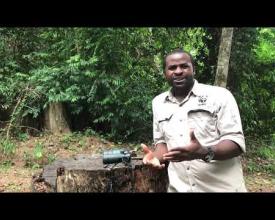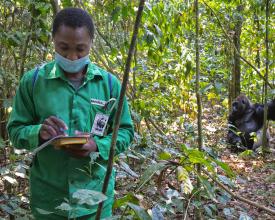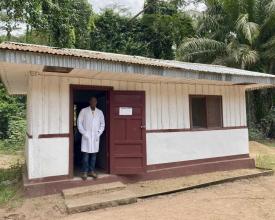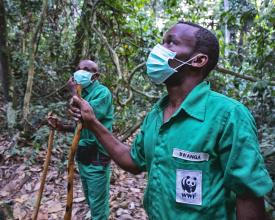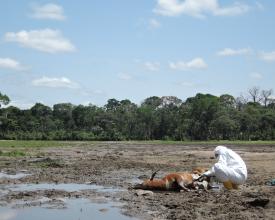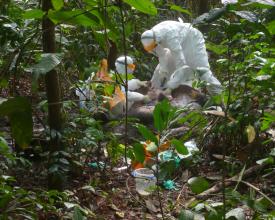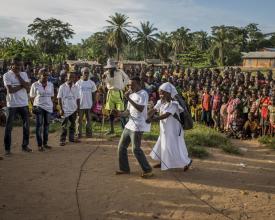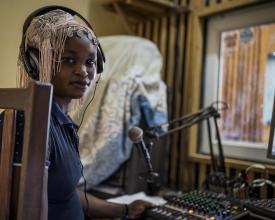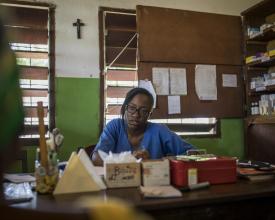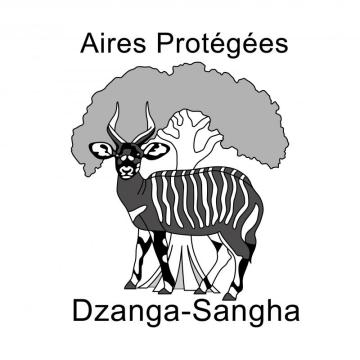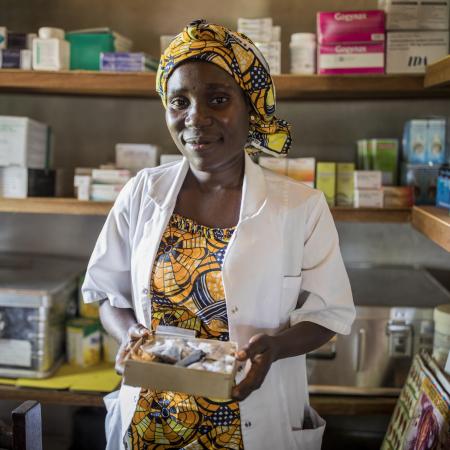
One Health Program in the Congo Basin
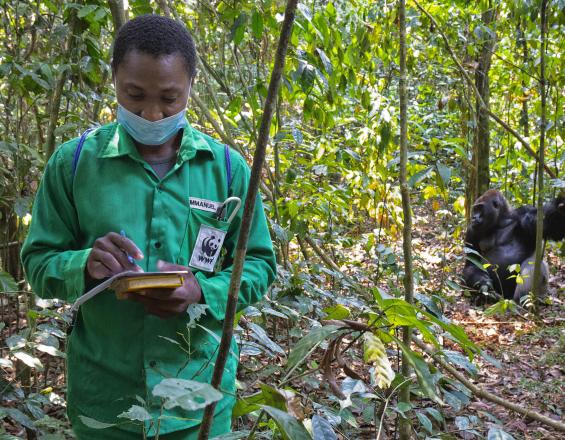
In one of the world's hotspots for zoonotic epidemics, the Congo Basin, WWF Germany has contributed significantly to the establishment of an early warning system for zoonotic pathogen outbreaks.
In two ecotourism sites, Dzanga-Sangha Protected Areas (Central African Republic) and Campo Ma'an National Park (Cameroon), WWF has been following a One Health approach since 2012, which takes into account wildlife and human health as well as intact natural habitats. From the beginning, WWF has been working closely with the Robert Koch-Institute (since 2021: Helmholtz Institute for One Health, HIOH).
The goal of the One Health Program is to establish a health monitoring system for people, wildlife and their habitat that benefits the local population in terms of their health and natural livelihoods. The aim is to rapidly detect the spread of zoonotic pathogens in order to establish an early warning system for disease outbreaks (including Ebola, monkeypox and anthrax).
Contexte
Challenges addressed
- Human & Animal Health - In the Congo Basin, people come into close contact with wildlife, through wildlife trade and bushmeat consumption, habitat degradation and ecotourism. This bears the risk of zoonotic spillover events between wildlife and humans. Epidemic outbreaks can threathen human population, as well as animal population (especially rare western lowland gorilla population).
- Public health infrastructure - Access to care is often very limited.
- Monitoring & Research - The forests in the Congo Basin harbour some of the world’s deadliest infectious agents such as Ebola viruses and Aanthrax-causing bacteria. Yet, in the those remote areas, we often lack data and infrastructure to set up monitoring systems.
- Intact natural habitat - Habitats lose their function to act as natural barriers if they disappear through deforestation and degradation due to settlements, road building, clearing for agriculture, timber extraction, mining, wildlife trade.
Emplacement
Traiter
Summary of the process
Monitoring of wildlife and human health as well as sensitisation and training elements are both essential to improve health and wellbeing of people and reduce the risk of disease transmission between people and wildlife with potentially deadly consequences.
This approach has proven successful during the COVID-19 pandemic. While awareness was raised about the unknown disease and preventive mesaures, strict measures had also been taken to protect the habituated gorillas from potential infection. Regular testing for both employees as well as the local population have been undertaken in the field laboratory, health status of apes were closely monitored as part of the early warning system and sensitisation programs were launched to prevent and reduce spreading of the disease within the communities.
In Dzanga-Sangha and Campo Ma'an, the field laboratories and related human resources are integral part of the protected area management. Involvement and targeting of local and indigenous population is a key element, not only in preventing zoonotic diseases, but also in assuring sustainable development and longterm support for conservation in the areas. Which is essential to protect habitats as natural barriers for zoonotic spillovers.
Building Blocks
Early Warning System
Through a fully functioning integrated health monitoring system for people, habitat and habituated apes and other wildlife, an early warning system was created. The aim is to detect prevalent diseases early and prevent its spreading within wildlife or human population through improved collaboration with public health and civil society actors. The Health monitoring system comprises:
Health condition of habituated gorillas are monitored daily. The Primate Habituation Programme was started by WWF back in 1997 and is one of the main pillars of the conservation work in Dzanga-Sangha ever since. Habituation has started in Campo Ma'an since 4 years.
A variety of methods are used to investigate the spread of zoonotic pathogens in the natural habitat, such as collecting monthly faecal and urine samples from the gorillas and, less frequently, from mangabeys, collecting vectors such as carrion flies, and regularly taking swab and necropsy samples from carcasses. These are then analysed in the field laboratory.
Conservation and ecotourism employees and their families receive annual health checkups and vaccinations, and are closely monitored in suspected cases.
Enabling factors
- an operational field laboratory for the collection and analysis of samples from wildlife,
- continous health monitoring of the habituated gorillas;
- regular health monitoring of conservation and ecotourism staff and their families.
Lesson learned
- The long-term cooperation with RKI/HIOH has contributed to the professionalisation of the field laboratories through equipment, training and knowledge exchange.
-
Preventive health surveillance and the consideration of human, wildlife and habitat health within a One Health concept proved to be very effective in tackling the COVID-19 pandemic. Quick and targeted intervention was possible.
-
Peer-to-peer training and knowledge exchange between the two sites has substantially improved performance in Campo Ma'an.
Sensitisation and training
Sensitisation of the local and indigenous population is a key element in preventing major outbreaks of epidemics such as Ebola, anthrax or respiratory diseases. The direct and extended target group of the project includes staff of the primate habituation programme and their families, tourist guides, ecoguards, researchers, project staff, tourists and indirectly the local population.
Human Health Care - Conservation and ecotourism staff and their families receive an annual health check-up and vaccinations. In addition, access to health care for the general population was strengthened through cheaper or free health care in health stations and hospitals. A mobile unit was also set up to provide initial health care in remote locations.
Awareness raising - Radio programmes about zoonotic and infectious diseases have been designed to reach a broader audience. To target the indigenous population, an educational film was produced in local languages, and an indigenous youth organisation developed interactive theater plays to sensitize communities about infectious diseases and preventive measures.
Training - Health staff from 13 health stations in Dzanga-Sangha were trained through simulations to appropriately react in case of (epidemic) disease outbreaks.
Enabling factors
- WWF has been active in Dzanga-Sangha for over 30 years
- Good and trustful relations with the local and national actors
- Holistic conservation approach that integrates sustainable development, cultural identity and ecological aspects.
Lesson learned
- Social: Long-standing and participatory awareness-raising by local actors on hygiene measures and zoonotic disease transmission risks proved extremely helpful in the context of the Corona pandemic.
- Health: Employee health programmes should be directly supervised and coordinated by professional doctors in future projects.
Impacts
Long before One Health was publicly known, WWF was doing pioneering work in the Congo Basin. Thanks to the field laboratory built in 2012 in Dzanga-Sangha, it is possible to test for for highly infectious diseases such as Ebola or anthrax. The field laboratory in Dzanga-Sangha has been expanded since 2017 and a second field laboratory has been established in Campo Ma'an. Impacts of the WWF One Health Program includes:
Animal health - The laboratory analyses allow regular monitoring of pathogen prevalence in wild animal carcasses and habituated great apes. Health statuts of habituated great apes is continously monitored.
Research - Regular and systematic sampling since 2012 provides WWF and RKI/HIOH with 10 years of data, which is of immense value for long-term studies.
Human Health - The program includes regular health care for employees and their families. Access to health care for the local and indigenous population in the regions is also facilitated.
Public health - Cooperation between local actors has been improved to react quickly in suspected cases of zoonotic diseases. During the COVID-19 pandemic, the laboratory in Dzanga-Sangha was one of two laboratories in the entire CAR that could test for COVID-19.
Capacity building - Two local veterinarians and numerous laboratory assistants have received indepth training.
Beneficiaries
- Local and national health care & civil society actors
- Conservation and ecotourism employees and their families
- Local and indigenous population
- International research community
- Local researchers
- Ecotourism
- Habituated wildlife
Sustainable Development Goals
Story

Protecting Habituated Great Apes against Corona disease infection
Great Apes are susceptible to human diseases. Strict measures are taken to protect habituated western lowland gorillas to protect them from COVID-19.
https://dzanga-sangha.org/covid-19-and-gorillas/
Improved access to health care
Human wellbeing and the protection of the rainforest are inextricably linked. WWF supports health care for local and indigenous people through mobile health units, improved access to health care and intervention by health specialists.
https://dzanga-sangha.org/stories/sustainable-development-and-education/
